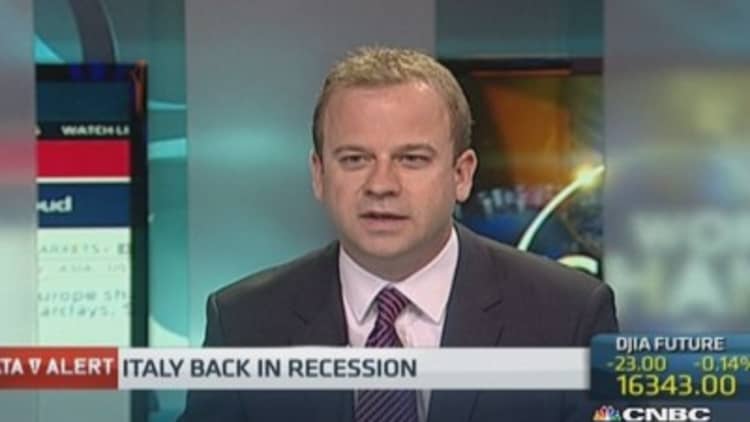Weak manufacturing data for Germany has heightened concerns that the country is losing economic steam, hit by an aggressive Russia and a slow recovery in the euro zone.
German manufacturing orders fell 3.2 percent month-on-month in June—the largest decline since September 2011—while the annual rate slumped 2.4 percent.
This was worse than expected, despite warnings from the country's central bank, the Bundesbank, that the economy had stalled in the second quarter. Business confidence data and forward-looking indicators have also suggested a softening trend.
Manufacturing orders from abroad fell 4.1 percent in June, which the German Economy Ministry linked to sanctions against Russia amid the Ukrainian crisis. It cited "geopolitical developments and risks" as the dominant factor in the "clear reticence in orders".
"We have had the Malaysian airlines tragedy and the escalation of sanctions since then (June)—so it is reasonable to assume that the geopolitical impairment to business activity may well get worse still before it gets better," said Derek Halpenny of Bank of Tokyo-Mitsubishi in a research note after the data was released.
Read MoreShould you invest in this 'high-beta Germany?'
In July, the European Union and the U.S. announced new penalties against Russia, including barring its biggest state-run banks from raising finance in the West's capital markets. Europe has also banned selling arms to Russia, along with certain types of oil exploration technologies.
German companies including Adidas and Lufthansa have already complained about the impact of Russia sanctions on their business. Russia is also the principle source of energy for Germany, with 31 percent of its gas imports coming from the country.
Read MoreEuropean CEOs undeterred by Russia, BES failure
Germany also has the highest exposure to eastern Europe among the larger euro area countries, exporting around 15 percent of its goods to the region, although exports to Russia account for only 3.3 percent out of this, according to Societe Generale.
"In this sense, Germany is not the canary in the coal mine, unless the sanctions indirectly also hit on eastern Europe more broadly," said Societe Generale's Anatoli Annenkov in a note on Tuesday.
"This also explains the German government's decision to stop a defense contract worth 120 million euros ($160 million) this week, suggesting confidence that sanctions will not hurt the economy materially in the medium-term."
Read MoreWhy a weaker Germany could hit eastern Europe
Concerns are rising that Russia will retaliate against the sanctions, however—a prospect that Annenkov and some other economists warned was more problematic. A Russian business newspaper reported on Tuesday that the country was considering banning European airlines flying through Russian airspace, and Moscow has already begun to target iconic Western food brands, including McDonald's.
"In our view, the direct impact from the sanctions on Germany will be rather limited. It is rather the possible reaction from Russia, which could affect German growth in the second half of this year," warned ING Economist Carsten Brzeski in a note on Wednesday.

In addition, Wednesday's figures showed Germany suffered a 10.4 percent decline in orders from the euro area in June.
Read MoreGoldman calls time on Europe peripheral debt rally
"Today's data shows that downside risks for the German economy do not only come from geopolitical tensions but also from longer-than-expected weak demand from euro zone peers," said Brzeski.

This risk was highlighted on Wednesday by disappointing gross domestic product (GDP) data for Italy. The euro area's third-biggest economy contracted by 0.2 percent quarter-on-quarter between April and June.
Read MoreItaly unexpectedly slides back into recession
"Italy's provisional GDP data provide a timely reminder that the euro zone economy is still deep in the mire," said ADM ISI Chief Economist Stephen Lewis in a note.
—By CNBC's Katy Barnato

